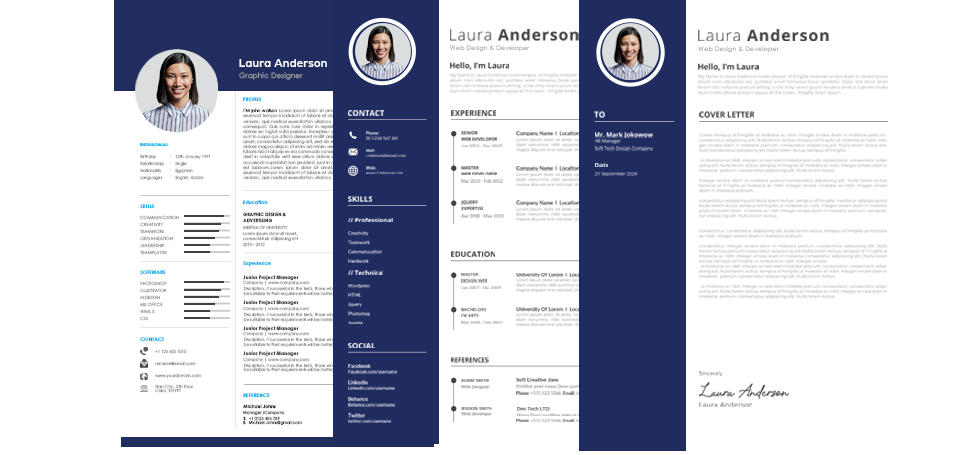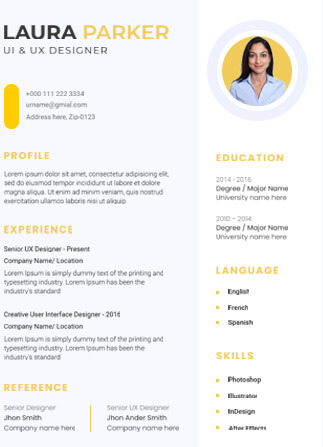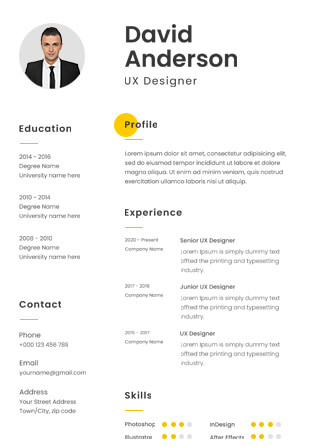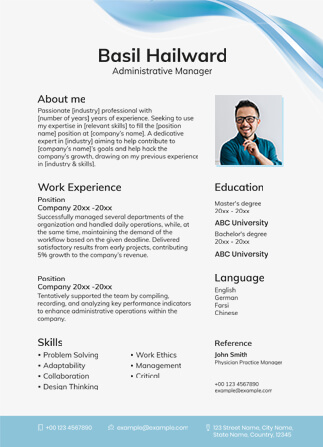Business Analyst Resume Examples - Empowering Job Seekers
A business analyst is a professional who helps organizations improve their performance by identifying and solving business problems. They analyze and understand the needs of the business, its customers, and its stakeholders and use this information to develop solutions that improve efficiency, reduce costs, and increase revenue. Business analysts may work in various industries and roles, including IT, finance, marketing, and operations. They may also be involved in the planning and execution of projects and the development and implementation of new business processes and systems.

Let's Craft a Professional Business Analyst Resume Example
A business analyst job is a way challenging. In their work, they evaluate how organizations are performing and help them improve their processes. However, crafting a professional business analyst resume is easy now with our best professional business analyst resume examples. You can get a highly proficient business analyst resume by using our tips and expertly crafted business analyst resume templates.

In this space, we will cover the following:
- What qualities should a good business analyst resume demonstrate?
- How to structure your business analyst resume for maximum impact?
- How can entry-level business analysts showcase the potential in their resumes?
- Tips on how to write an attention-grabbing summary section for your business analyst resume?
How to Structure Your Business Analyst Resume for Maximum Impact?
A well-structured business analyst resume is essential to showcase your skills and experience and to stand out in the job market. Make sure to tailor your resume to the specific role you are applying for and highlight your achievements and qualifications. Remember that a resume is a marketing tool, and it should explain how you can add value to the organization. Here is how you should structure your business analyst resume.
Headline and Summary
The headline and summary are the first things a hiring manager will see on your resume. Your headline should be a brief statement that summarizes your professional identity, such as “Business Analyst with five years of experience in data analysis and process improvement.” The summary should briefly overview your skills and experience and how they align with the role you are applying for.
Professional Experience
The professional experience section is the most critical part of your resume. This is where you will showcase your skills and experience and exemplify how you can add value to the organization. List your professional experience in reverse chronological order, starting with your most recent job.
Include the following details for each job:
- Job title
- Company name
- Dates of employment
- Responsibilities and accomplishments
Make sure to use action verbs and quantify your achievements. For example, instead of “Responsible for data analysis,” you can write, “Conducted data analysis resulting in a 15% increase in efficiency.”
Education and Certifications
The education and certifications section should include your academic qualifications and any relevant certifications. List your highest level of education first, followed by any other relevant degrees or certifications.
Mention your Skills
The skills section is an opportunity to highlight your technical and non-technical skills. Include any relevant software or programming languages you are proficient in and soft skills such as communication or problem-solving.
Additional Sections
Other sections that you can include in your resume are:
- Awards and achievements
- Volunteer experience
- Professional memberships
- Personal projects
These sections can confirm your commitment to your profession and showcase your skills and experience differently.

How Can Entry-Level Business Analysts Showcase Potential in Their Resumes?
As an entry-level business analyst, you may wonder how to showcase your potential in your resume. After all, you may not have much experience in the field yet, but you still want to make a strong impression on potential employers. Here are some tips on how to do just that.
Highlight Your Education and Relevant Coursework
One of the best ways to showcase your potential as an entry-level business analyst is to highlight your education and relevant coursework. This will prove that you have the foundational knowledge and skills required to succeed in the field. Include any degrees or certifications you have earned and any relevant coursework you completed.
Emphasize Your Problem-Solving Skills
Business analysts are often called upon to solve complex problems and identify opportunities for improvement. Highlighting your problem-solving skills in your resume will present that you can think critically and develop creative solutions. Be sure to include specific examples of how you have used your problem-solving skills, such as a project you completed or a problem you solved at a previous job.
Include Any Relevant Work Experience
Even if you don’t have a lot of experience as a business analyst, any relevant work experience you do have should be included in your resume. This could include internships, co-op positions, or part-time jobs. Be sure to highlight any skills or responsibilities you had that are relevant to the business analyst role.
Show Your Enthusiasm for the Field
As an entry-level candidate, you must show that you are eager to learn and grow in business analysis. This could include joining relevant professional organizations, attending industry events, or participating in extracurricular activities related to business analysis. By demonstrating your enthusiasm for the field, you’ll be able to show potential employers that you are committed to becoming a valuable member of their team.
Use Strong Action Verbs
Strong action verbs in your resume make it clear that you are a proactive and results-driven candidate. Words like “analyzed,” “managed,” “created,” and “implemented” will demonstrate that you have the skills and experience to succeed as a business analyst.
By following these tips, you can showcase your potential as an entry-level business analyst and increase your chances of landing your dream job. Remember to tailor your resume to the specific job you are applying for, and don’t be afraid to ask for feedback from others to help make your resume as strong as possible.
Tips on How to Write an Attention-Grabbing Summary Section for Your Business Analyst Resume?
A substantial summary section can be the key to catching the hiring manager’s eye and landing an interview. Here are some tips to help you write a compelling summary section for your business analyst resume.
- Keep it short and sweet: Your summary section should be brief and to the point. Please keep it limited to a few sentences and ensure they are clear and concise.
- Highlight your skills and experience. Your summary section should highlight the skills and experience that make you a strong candidate for the business analyst position.
- Use action words. As discussed, make sure to use action words in your summary section to show that you are a proactive and results-driven candidate.
- Summary section. Your summary section should be tailored to the specific business analyst position you are applying for.
- Include your most recent and relevant experience. Your summary section should focus on your most recent and relevant experience.
These tips help you write an attention-grabbing summary section for your business analyst resume. Here are our other resume examples to help you write your excellent resume.
What Qualities Should a Good Business Analyst Resume Demonstrate?
A good business analyst resume should present a combination of technical expertise, problem-solving, communication, project management, and business acumen. By highlighting these qualities, you show potential employers that you’re the right candidate for the job.
Technical Expertise
In a professional business analyst resume, it is crucial to show your technical expertise. This might include highlighting specific software or programming languages you’re familiar with and any relevant certifications or degrees you hold.
Problem-Solving Skills
Your business analyst resume should present problem-solving skills. Specifically, highlight projects you’ve worked on that required you to think critically and develop creative solutions.
Communication Skills
A proficient business analyst resume must include communication skills, as business analysts must communicate effectively with various stakeholders, including clients, managers, and other team members.
Project Management Skills
Being business analysts, you should mention the projects you’ve managed and any relevant certifications or training you’ve received.
Business Acumen
Business analysts need to understand the big picture and how different parts of the organization fit together. As such, it’s crucial to present your business acumen through your resume.
Unbeatable Resume Options with Unmatchable Quality
Quick Questions
You should include your education, certifications, and relevant work experience in your Business Analyst Resume. This includes your experience in data analysis, project management, and business process improvement.
Your business analyst resume should be straightforward, with a professional, neat design. Use bullet points to list your qualifications and accomplishments, and include a summary or objective statement at the top of your resume.
You should highlight your analytical skills, problem-solving abilities, and experience in project management. Also, mention your expertise in data analysis and business process improvement, as well as any relevant certifications or education.
A cover letter is a great way to provide more information about your qualifications and highlight your interest in the position. Use it to explain how your skills and experience align with the job requirements and how you will be an asset to the company.
To make your Business Analyst resume stand out, highlight your accomplishments and achievements rather than just listing your responsibilities. Additionally, you can include any industry-specific certifications or awards you’ve received.








